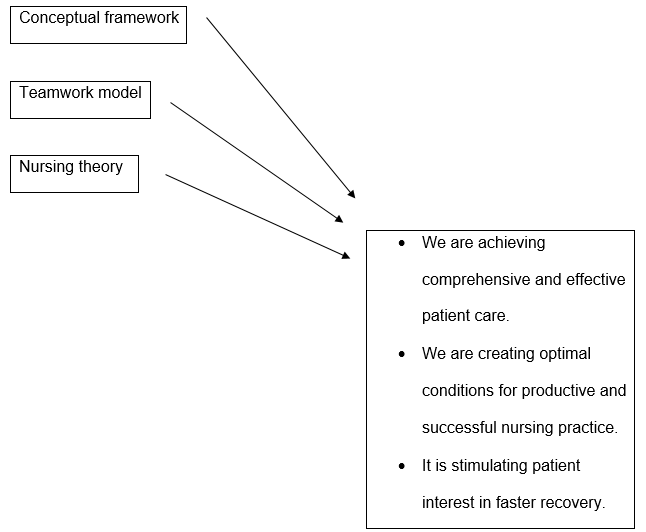Introduction
- The description of a nursing conceptual framework.
- The framework components correlate with one another.
- A nursing model based on teamwork.
- Teamwork is one of the main elements of success.
- Orem’s nursing theory about self-care deficit.
- The ability to address personal needs on one’s own.
Conceptual Framework
- Feedback on nursing practice is a key indicator.
- “Nurses’ well-being and quality improvement” are dependent variables (Giesbers, Schouteten, Poutsma, Van der Heijden, and Van Achterberg, 2015, p. 682).
- Feedback is considered an essential component.
- Employees’ work depends on the quality of this indicator.
- Interdependencies among the variables are traced.
- Creating conditions for promoting the framework.
Conceptual Framework: Application to Practice
- An opportunity to address the significant components of nursing.
- The use of feedback to stimulate quality work.
- The comparison of different outcomes of feedback to nursing.
- The analysis of job prospects in different conditions.
- An opportunity to determine the role of feedback in nursing.
- We are achieving professional success through individual one.
Teamwork Model of Nursing
- A teamwork model for comprehensive care.
- An opportunity to improve the quality of interaction with patients.
- We are improving nursing knowledge and professional skills.
- The promotion of cohesion in a nursing team.
- A background for comprehensive and credible interventions.
- The highest quality of help and care.
- She frequently addressed models in nursing.
- The methodology is based on core team principles (Rahn, 2016).
- “More effective team coordination and efficiency” (Rahn, 2016, p. 262).
- Failures are fraught with missed care and complications.
- Patient outcomes are the main objectives of interventions.
- Cohesion is based on achieving common goals.
Nursing Theory
- Dorothy Orem’s theory of self-care deficit.
- An opportunity to help patients fulfill their needs.
- Application in different care settings and environments.
- “A fully dependent patient” (Naz, 2019, p. 34).
- Individual patients’ limited abilities and mobility.
- Help regardless of all external factors.
- “Man is a reasonable organism with rational powers” (Naz, 2019, p. 34).
- I am combining assistance systems for comprehensive interventions.
- Addressing self-care needs promotes recovery.
- Universal and individual needs are implied.
- Interaction with patients at all stages of care.
- Risk prevention is one of the main principles (Naz, 2019).
Nursing Theory: Application to Practice
- Constant contacts with vulnerable patients.
- Engaging family members for comprehensive assistance.
- We are creating optimal conditions for recovery.
- She was addressing the daily needs of patients.
- Education is an important component of the theory.
- Stimulating patients’ personal interest in faster recovery.
Graphical Reflection
- The conceptual framework fits the model and the theory.
- Nurses’ work depends on different perspectives.
- Creating conditions for effective activities is crucial.
- Feedback is the critical component of the framework.
- The components are in direct dependency.

- The framework, model, and theory fit together.
- Their combination provides comprehensive patient care.
- Following all the principles is the key to success.

Conclusion
- Feedback is important in nursing practice.
- Teamwork can enhance the quality of care.
- Constant interaction with patients contributes to their recovery.
- The ability to work comprehensively provides successful perspectives.
- Following comprehensive care, principles reflect nursing professionalism.
- Combining intervention techniques expands the range of positive outcomes.
References
Giesbers, A. P., Schouteten, R. L., Poutsma, E., Van der Heijden, B. I., & Van Achterberg, T. (2015). Feedback provision, nurses’ well-being and quality improvement: Towards a conceptual framework. Journal of Nursing Management, 23(5), 682-691.
Naz, S. (2019). Application of Dorothea Orem’s theory into nursing practice. Journal of Rehman Medical Institute, 3(3-4), 34-37.
Rahn, D. J. (2016). Transformational teamwork: Exploring the impact of nursing teamwork on nurse-sensitive quality indicators. Journal of Nursing Care Quality, 31(3), 262-268.

